|

Lunar eclipse, 2008, as seen from Kentucky.
(*photo credit)
December 1, 2013 Advent Comes through Proper Preparation
The night is almost over, it will be daylight soon -- let us give up all the things we like to do under cover of the dark; let us arm ourselves and appear in the light. (Romans 13:12)
Doing something in the light is a public event, and that is what Advent prepares us to do. The Church starts a new year today, and we ought as people of faith to be willing to come to the light of publicity. Urgency prods us as we observe days shortening and time span a precious commodity. In the coming weeks we light each additional Advent candle in succession, as we note creeping night. We must get deeply involved in an ever more troubled world -- and do this with open eyes of faith.
Resolving to be active is not enough; we must be willing to make a public act. It is the season of anticipation and expectation, of watchfulness and waiting. We need to stay alert, but that is not always so easy. Sometimes we get drowsy and so call to others to help stay awake; it's too hard to go it alone. We know that sentinels who sleep risk leaving the place subject to attack. In non-militaristic ways, we are an alert people who need freshness for doing a good job -- and freshness comes with adequate balancing of our collective lives with hopes of better things to come. However, the consumer culture lures us, even when we know that affluence dulls the senses and simpler living freshens them.
When seasoned travelers prepare for a trip; they plan what they need: an itinerary, mode of transport, tickets and proper papers, and contacts with hosts, friends, and associates when away. When we prepare for the coming of Christ we carefully make ready as well. Jesus gives us suggestions worth noting: be alert, be mindful of others in our lives, be willing to forego allurements that will distract us, be nourished with the Bread of Life. Further detailed specifics are harder because we each have different living circumstances. But Jesus gives us individual attention and is thus personally honed to our own needs. Some of our company are exhausted, depressed, institutionalized, or people suffering from traumatic events. We are aware of this and resolve to do more to stay fresh and alert.
In our readiness we recall that we become other christs for our depressed brothers and sisters. We are light in a darkening world. Let's approach each person we meet gently, fully aware of our limited role in their journey. In freedom, each must respond to the coming of Christ in their lives. However, we become the unexpected event that they may not realize, but for which there is an interior hunger. To be a strong and clear light for them requires our own purification, our prayer, and our living simply. Part of our vigilance is discovering how to be christ to others.
Prayer: Lord, give us the courage to prepare for your coming and to be willing to profess publicly that we are believers in a world that needs the light of truth.
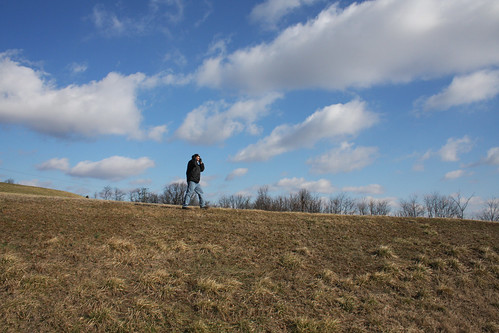
A December stroll. Anderson Co., KY.
(*photo credit)
December 2, 2013 Awaiting Means Becoming More Down-to-Earth
One would perhaps be tempted to say that awaiting the coming of the Lord Jesus means forsaking the concerns of Earth and thinking only of "things of Heaven." However, this attitude falls short of the mandate to be involved Christians here and now. St. Paul was explicit in his admonition to his Thessalonian congregation who considered waiting for Christ as mere sitting around until a miracle happens. His words were stark: "If you don't work, you don't eat." Idleness is not active waiting but an excuse for laziness. In fact, our expected work consists in hastening the Day of the coming of the Lord. We prepare for the New Heaven and New Earth through what we do with God's grace.
Being down-to-earth means simplicity in our manner of acting, a set of proper and appropriate practices that do not harm people or environment. To act properly we open ourselves to learn from natural processes to conserve resources, respect all other creatures, and live in a gentle fashion. Those, who understand that animal products are resource intensive, will direct their habits to more vegetarian choices. When we realize that commercially-prepared foods are laden with unhealthy levels of fat, sugar, and salt, we look for bulk unprocessed foods and home-prepared meals. Yes, living simply takes effort and makes awaiting a kind of meaningful work done in confidence.
Down-to-earth is everyday activity. The same principles of appropriate means and activities extend to transportation, lodging, choice of fuels, conservation in heating and cooling, water saving devices, home gardening and lawn care, physical exercise and health care, and general community relations (such as silence space). In fact, all aspects of everyday living become a careful and prudent concern about that individual human body and that of community welfare. In about 200 places in these Daily Reflections we have mentioned and described such suitable practices. In doing so, we espouse simplicity of life through down-to-earth spirituality.
Down-to-earth is to defend against hostile and aggressive practices occurring today that are causing damage. "Awaiting" means participating in political and civic activities that ensure the health and safety of our wounded Earth. This goes beyond seeing the good in creation and showing respect through appropriate lifestyle; it includes changing the structures of our currently unjust society so that peace and justice can reign and that the day of the Lord will be hastened. When we see harm befall our troubled world, we cannot stand by idly; we must act as the Spirit directs us. Active awaiting is central to Advent calls for prayer and spiritual growth; this demands discovering and using resources at our disposal. We need the sacramental life offered to us; we need to support the faith of the assembled community to help us grow together. We give humble or down-to-earth service.
Prayer: Lord, help us champion simple ways so that we are better inclined to defend our troubled people and Earth.

Alexander Lee, "Waking Green Dragon" -
Beijing China.
December 3, 2013 China: A Challenge to a Greener Global Future
On this feast of St. Francis Xavier, who died before reaching mainland China, we consider this amazing land of his dreams. China is on a risky journey of industrial growth that could have serious environmental consequences. However, former cases of industrialization involved far less populated nations and far smaller overall impact. China is massive (one-fifth of the world's population) and uses immense amounts of the world's resources as the workshop of the planet (40-45% of aluminum, coal, copper, nickel, and zinc). Emissions from Chinese industrial operations are generating extraordinary amounts of air (far exceeding WHO limits) and water pollution; this bodes poorly for prospects of global climate change control. Today air and water pollution cuts five and a half years from Chinese life averages.
China is responding through the alarm of concerned citizens who may be weakening the structures of their national government. In turn, the government simultaneously suppresses some dissent and attempts environmental clean up ($275 billion over the past five years). Even such impressive efforts do not fully address severe problems. China is the world's leading carbon dioxide (greenhouse gas) emitter at about 30% of the global amount (only 10% in 1990). China has more people affected by ocean-rising levels than any other country (600 million). In fairness, recipients of Chinese exports bear some blame due to pollution contained in manufactured goods. However, apportioning blame to a broader world does not reduce the problem, for the spotlight continues on China.
Chinese agencies and citizens see that air, land, and water clean up is most challenging. As with other industrial nations, China is focusing on energy efficiency to cut into hydrocarbon use per person (current per capita equals Europe) -- and it could make further headway through auto and truck efficiency. China is the world's heaviest investor in green energy and leads in wind and solar applications. However, China lags in fracking technology and its coal mines are unsafe while at full production; its offshore wind has massive but untapped potential; its geothermal is hardly touched. China seeks to leave the carbon economy when plunging deeper into it. Turning from exports to consumer demands for autos, air conditioning, and smart phones comes at an ever-increasing renewable AND non-renewable energy price tag.
Chinese spokespersons say they are faithfully following the West, but for a populated land like China that is not good enough.
Chinese energy policy, like that of the U.S., has global implications. The world is watching the major polluters, and public relations may have an effect. Concerned Chinese seek and are finding global solidarity on environmental issues. This is something that warms the hearts of those modern Francis Xaviers who want to help arouse and encourage the awakening Chinese giant.
Prayer: Lord, give us grace to share our spiritual concerns
with the good people of China, for the good of all people.
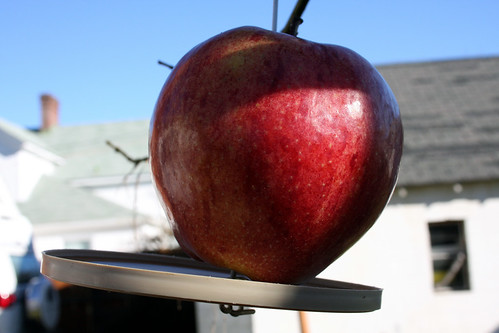
Fresh apple, for the birds.
(*photo credit)
December 4, 2013 Salvation and the Dangers of Riches
He who trusts in riches will have his fall,
the virtuous will flourish like the leaves. (Proverbs 11:28)
Trust in wealth is something we have reflected upon often. Why? Because this is a problem both in our nation and our highly consumer-oriented world. Jesus speaks on this subject when he says in all three Synoptic Gospels that it is easier for a camel to pass through the eye of a needle (Matt. 19:23-26, Mark 10:23-27, and
Luke 18:24-27). Yes, a hard saying with a message that invites us all to change our respective lifestyles.
Jesus' audience and disciples were incredulous. Do not all people trust in riches and find them a God-given blessing? Jesus really does not soften his message unless one focuses on his final remarks that all things are possible with God. In some ways, this is an argument for purgatory for, while the love of and trust in riches excludes one from the Kingdom, perhaps with God's mercy in time the excluded may be included. Others find Jesus' primary saying so contrary to their religion of prosperity that they seek desperately for softening elements. One says an alleyway and entrance in Jerusalem is called "eye of the needle" and Jesus means this place -- but that is dubious for the disciples showed a sense of shock and disbelief that comes with the harder meaning.
Let's not soften Good News, for initial hardness has a jarring effect that must be understood in finding our trust in the God of mercy and love. The message of Good News is meant for everyone, and all of this world seems to suffer from finding this News disconcerting at times. Only a few are rich, but a great number would like to be. Therefore they regard the wealthy as blessed. Thus, in an evangelistic spirit we ought to tax the wealthy into a stance nearer the general population so they will have a chance for the Kingdom of God. But this hard message does not sit well with most donors and so we must stay poor for the sake of the "full Gospel." Do churches really preach the harder message?
It would be impossible to expect miracles and a collective inspiration by the wealthy to become one of us, or the poor to cease from craving wealth. The wealthy excuse is that riches are a temporary stewardship, and so governmental intervention could shorten that time span for the sake of healthy democracy. Sound economics and spiritual life coalesce. Citizenship involves our assisting in liberating the wealthy of ill-gotten gains. We can make the affluent confront their mortality before their death bed. Progressive forms of taxation help overcome the impossible and check the ever-expanding material greed. Prophets must help liberate people from the dream of an alluring affluence.
Prayer: Lord, give to us the courage to talk about true trust in you and to create a quake to this materialistic culture that will lead to a better distribution of resources.
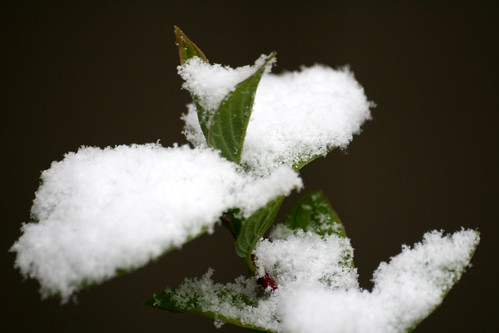
Nature's "tinsel" - snow in Kentucky December.
(*photo credit)
December 5, 2013 Should We Celebrate Tinsel Day?
This title's question is most intriguing for many, especially youngsters, caught up in the hype of the approaching holiday events and the gifts attached. They see holiday decorations that glitter, sparkle, and shine (the root of the word tinsel); historically, that includes interweaving threads of metal (silver, gold or others) into cloth garments and adornments. The practice is extended to shiny metallic (often tin) objects that are generally inexpensive but used for ornamental purposes. Actually, Hollywood is "Tinsel Town" for its showy character and lack of depth.
Eye catchers in simpler ages used tinsel to allure the unsuspecting. Today many of these objects and places would be regarded as cheap and gaudy and relics of a pre-computer gameless culture. Twenty-first century "tinsel"is more sophisticated, and inflated expectations include hundred-dollar computer games and five-hundred dollar electronic devices all for the wide-eyed and overly pampered. Tinsel Day is truly challenging for those who want to get alluring gifts to satisfy the material aspects of the holidays for home, work, study, entertainment, and even worship purposes. Tinsel today has a subtle enticement of soothing rapture and music emanating from Internet sources, elevators, stores and even mega-churches. Tinsel thrives in an inflated format.
Our Christian faith has a countercultural message. Christ did not come in tinsel, for Bethlehem's cave was bare, livestock munching hay all around, poor shepherds alert, and darkness punctuated by heavenly light. A Holy Family saw no tinsel, only the raw reality of a poor setting and a rich spiritual event. Our peace of soul needs to be reinforced by turning from the tinsel of modern life and finding something far deeper and more in keeping with that first Christmas. We must starkly recall that Jesus came and lived among us, suffering and dying so that we might enter into the divine family. What a sacrifice devoid of surface glamour! In fact, maximizing comfort for affluent people in a troubled world is giving in to the allurements of the evil one.
Christ coming has a sense of wholeness that gives us a purpose in life that goes far deeper than some entertainment during the holiday season. Jesus speaks a message of personal and community peace and security (not the tinsel of consumer goods and military might). Yes, true religion includes a streak of the uncomfortable, for to follow the Lord takes effort and willingness to suffer with him and all in this troubled world. The message is solid but spiritual, comforting but not comfortable, captivating but not materially alluring. The new-born Jesus confronts a troubled world shepherdless but in need. Our Discipleship has rough edges but we are invited to experience interior peace and simultaneous exterior restlessness. No tinsel for us please.
Prayer: Lord, teach us to deepen the true reason for this season, and carry a sincere message to others that reflects the depth of the calling.

Home-baked apple dumplings, to be shared as Christmas gifts.
(*photo credit)
December 6, 2013 Ideal Gifts for the Christmas Season
On this St. Nicholas Day we either give the presents we have stored for months, or we panic with Christmas fast approaching. The samples of gifts below do not conform totally to all the ideal characteristics -- but nothing in this world is perfect, nor will we apologize. Ideal gift characteristics gleaned from previous Daily Reflections include: sensitive to the one receiving or the love of the one giving; resourceful and not too great impact on pocketbook and Earth; useful or at least a keepsake worth remembering; locally conceived or created; and worthy of the spiritual event. Samples illustrating characteristics include:
Sensitive --
* Baked goods or food items liked by the recipient, and nutritious and not overly sugary, fatty, or salty;
* Books or reading material in a spectrum of varied interests honed to the current tastes of the recipient; and
* Poems, essays, or song renditions that are able to cheer someone who has experienced recent difficulties.
Resourceful --
* A potted herb or flowering plant, because of the need to brighten and freshen the home during drab winter months;
* Exercise equipment that may assist the person who needs to do ongoing practical physical activity; and
* Illustrated greetings cards or some other artistic artifacts (painting, pottery, textile item, wood carving, etc.) that utilizes personal and neighborhood resources.
Useful --
* Performance of a needed chore that the person receiving is unable to do in the normal course of events;
* An offered service when the person will be away on vacation, such as tending the grounds or feeding pets; and
* A gift to a charity either locally or at a distance in the name of the gift receiver.
Local --
* Fall produce or canned or preserved material from the year's growing season meant just for this person;
* Heritage seeds that are perfect for a budding gardener; and
* Help in an anticipated celebration for an anniversary.
Worthy --
* Visit to the sick or shut-ins at a convenient time and include a token gift as well;
* Call on or near Christmas Day to see how the person is doing; and
* A day's prayers and sacrifices for an individual with deep concerns such as an impending treatment or major surgery.
Prayer: Lord, extend our minds through the intercession of St. Nicholas to discover what good things we can do or give this season.
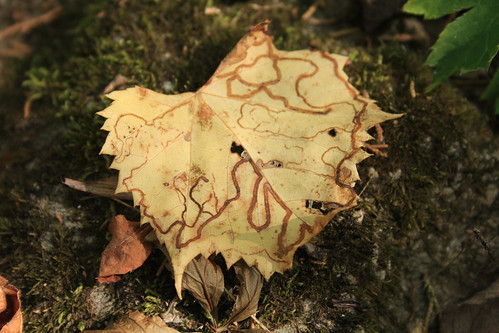
Beauty in a past-prime leaf.
(*photo credit)
December 7, 2013 Patriotism Is Sharing Not Isolating Ourselves
On this day 72 years ago, the United States was unexpectedly attacked at Pearl Harbor. The attack stirred the patriotic fervor of an isolated nation while President Roosevelt was trying desperately to give assistance to democratic allies being overwhelmed by Nazi Germany and imperialist Japan. American isolation was reinforced by two oceans thought too wide for airplanes to easily reach. Then came the surprise. More of us remember the further surprise of September 11, 2001 when terrorists struck the New York City Twin Towers and Pentagon. Again, attackers were effective at awakening a complacent nation.
Today, America is still vulnerable but with security and surveillance so comprehensive that libertarians regard it as infringing on Fourth Amendment citizen rights. The current Federal security systems unintentionally look into citizen communications without proper search warrants and people don't like snoopers. However, this freshly minted libertarianism borders on the isolationism of the pre-World War II period. too much self-interest makes us unaware of the broader global problems.
A fellow Kentuckian, the late Gatewood Galbraith, who visited ASPI, was nationally known as a promoter of hemp and medicinal cannabis in his witty 2004 book The Last Free Man in American. However, his limited appeal while running unsuccessfully for governor five times could have been through casting in with "nationalistic" militia and other gun toters (the book's cover has him holding an automatic weapon in an aiming pose). He loved his "commonwealth" (Kentucky), but never saw that patriotism could take a global dimension. I now regret after his unexpected passing not to have had a chance to talk about casting his message in a broader perspective for both economic hemp and medicinal marijuana.
Sharing our democratic values in a waiting world is a primary act of extended patriotism, with its paternal or fatherly protecting aspects. America has through the Monroe Doctrine, NATO, UN, and a host of treaties sought to extend its democratic insights; it wanted to bring these engaged in the Arab Spring in Iraq, Syria, Egypt, and Tunisia, but our way. Longer-term sharing could include federalizing financial transitions and money flight from one country to another; tax haven situations must be globally addressed for the benefit of all people. We have lessons worth sharing: America's 18th century problems stemming from trade barriers among states and confounding America's founders were overcome through cooperative action. Climate change demands globalizing efforts as well. We who successfully federalized thirteen states with a variety of problems over time know the way to federal success. Our patriotism can be exercised now by advocating global federalization in addressing issues and to see it as fulfilling our American ideals and values.
Prayer: Lord, give us an understanding of our many American
gifts and experiences, and help us share them with a needy world.

The evergreen Christmas fern, Polystichum acrostichoides.
(*photo credit)
December 8, 2013 Immaculate Conception: Dawn of a New Age
A while ago I was teaching about Mary's privileges and her Immaculate Conception. One of the non-Catholic students asked, "Is that Mary's conception of Jesus?" “No,” I said, “December 8 is the Feast of Mary’s Conception, nine months before the Feast of Mary's birth on September 8.” This is the day we celebrate Mary's own conception without Original Sin, a challenging belief not only to Protestants but also to Catholic theologians like St. Thomas Aquinas.
St. Thomas argued quite correctly that Jesus is the savior of every human being including Mary so how could she be conceived without Original Sin before Jesus was even conceived, before he even existed as human? After all, Jesus had to become human to save us -- to become incarnate -- and that was not possible if Mary was not yet even conceived. It seemed impossible to Thomas, and his cogent argument was accepted by the church until the time of Duns Scotus, the English Franciscan theologian.
Scotus took a God's eye view of humanity and the incarnation of Jesus. He argued that humans could not be divinized (something all orthodox theologians accepted from the earliest writers) except in union with the Son become incarnate. Thus Jesus would have to become human whether or not humans had sinned. He would not have died the same ignominious death on the cross -- the harvest of our sinful rejection of God -- but we still would have needed the Son of God to become human for humanity to be raised to God's life. That was God's intention for the human race even before the first human was created. We were all created in view of Jesus who reveals not just what God is like, but also makes possible the raising of humans to the inner life of God. If Jesus was intended from the beginning, his mother must also have been intended from the beginning and given every preparation needed that was appropriate for Jesus. Since sin is an abomination to God, God’s Son’s would certainly be freed from sin if God could do it. Mary would also redeemed by Christ (Scotus agreed with Thomas and the Church on this essential point, for Scripture had said "there is no other name in which we can be saved.") However, she was redeemed in a preeminent way by being preserved even from original sin in view of Jesus' predestined incarnation. She stands with Jesus at the origin of our redeemed life.
But if Mary was free from original sin, would that not separate her from us and make her unapproachable? To have such a mother would hardly be "good news" since we could not identify with her and we would seem all the more sinful in light of her sinlessness. I have heard this concern from Protestants and some Catholic women. Looked at more closely, we see that it is sin that separated Adam and Eve from God and caused them to distrust and blame each other, to hide from self and God, be at enmity with creation, and bring suffering and death. Freedom from sin means to trust God and creation and actually brings us closer to it. As a result, freedom from sin would also make us more open to suffering. It is sin that makes us hide and build up defenses against suffering (ourselves and that of others). Freedom from sin opens us to the truth of all experience -- our own and that of others -- and makes us compassionate! We see that clearly in Jesus, who is "tempted in all in all things like us, but without sinning" (Heb 4:15). He suffered more than any other human for he totally trusted God, and so was open and undefended. That is why he was so compassionate with the poor and sinners. He felt their pain. He feels our pain, and he felt the deep pain of our sin in his cry from the cross: "My God, my God, why have you abandoned me." He and Mary are one with us because they have no sin, in a way they never could be if they had sinned. Sin closes us up to others and enslaves us. Because of sin the disciples ran and hid during Jesus' crucifixion. Mary stood beneath the cross -- experiencing in the depth of her heart the agony of her Son and human alienation from God. Her freedom from sin opened her to that destiny. We can approach her precisely because her freedom from sin makes her humble and more concerned about us than herself. It allows her to be one with us in our suffering and joys.
Further, we are not shamed by her gift, but ourselves gifted. Every grace of God is meant for the whole Body of Christ -- ourselves included. That is why we need to be "born again" (to be re-conceived free of sin) of water and the Spirit. (Jn 3:3) Like Mary, “God chose us in Christ before the foundation of the world to be holy and blameless before him.” (Eph 1:4) Those that are born of God "cannot sin" (1 Jn 3:9), for God's nature (Spirit) abides in them. In other words, insofar as we live our lives in God's Spirit we become more and more like Mary -- free from sin. We are not fully there. We still sin and can choose to live by the sinful ways of our surrounding world, but the power to live without sin is in us, and constantly draws us back to God.
That is "very good news," not just for Mary but for all of us. Mary’s freedom from original sin restores God’s dream for humanity, to walk familiarly with humans in the Garden. What we celebrate on December 8 is the beginning of God's redemption in Jesus' mother, God's excitement in preparing the long awaited vessel for His Son, anticipating the restoration of God's original dream in paradise -- the New Eve prepared for the New Adam. The heavens rejoice. With the poet Wordsworth all people can exclaim: "Our tainted nature's solitary boast." We all can rejoice because the gift given Mary is intended for us all, and is the beginning of our own coming home to God's deep forgiveness, healing and freeing.
Fr. Bob Sears, S.J.
President: Association of Christian Therapists
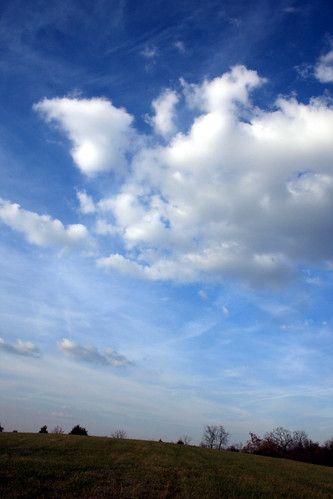
December skies.
(*photo credit)
December 9, 2013 Being Ourselves During Favorable Times
Each of us has a special calling and we find that as we prepare our gift to God in this new Church Year we ought to see what we have to offer in our unique way. Each gift from the heart is of immense value but we have to believe it. In Reclaiming the Commons we speak of finding our niche. We focus on Jesus who is all inclusive in his personality as expressed in Scriptures. Read Chapter Nine with the descriptions omitted here.
---------------------
Well, now is the favorable time; this is the day of salvation. (II Corinthians 6:2)
Radical sharing of the commons involves identifying those in most need, the poor (human and non-human), and to encourage all to work together in rising up and initiating a process of healing our wounded Earth. Most individuals are not gifted with each and every aspect of what it takes to be an ideal change agent, but certain characteristics are worthy of our aspirations and efforts to practice them. Could we take a collection of people and create a composite community "person"? Wishful thinking! Could we seek one person who contains all attributes? Perhaps he is present.
Each area of commons contains desirable characteristics:
1. Air/space -- Serenity in the face of creative mystery.
Did not our hearts burn within us as he talked to us on the road... (Luke 24:32).
2. Water -- Assertiveness of those in need of clean water.
Zeal for your house will devour me (John 2:17).
3. Land -- Loyalty by those wed to land in some fashion.
This is my commandment: love one another as I have loved you. (John 15:12).
4. Culture -- Joviality in order to stay connected.
Fill the jugs with water, and they filled them to the brim... (John 2:7).
5. Health -- Solicitude for those who need care.
No, anyone who wants to be great among you must be your servant (Matthew 20:26).
6. Intellectual -- Discipline to master knowledge and weaknesses.
I have come not to abolish but to complete them (the Law or the Prophets) (Matthew 5:17).
7. Quietude -- Sensitivity to needs of individuals.
As he drew near and came in sight of the city he shed tears over it (Luke 19:41).
8. Commerce -- Ambition without selfish possessiveness. Repent, and believe the Good News (Mark 1:15).
9. Society -- Wisdom to become reclaimers.
His teaching made a great impression on the people because he taught them with authority... (Matthew 7:28-29).
--------------------------------------------
Prayer: Lord, give us insight to see our own unique gifts and to be willing to offer these as a contribution for the common good.
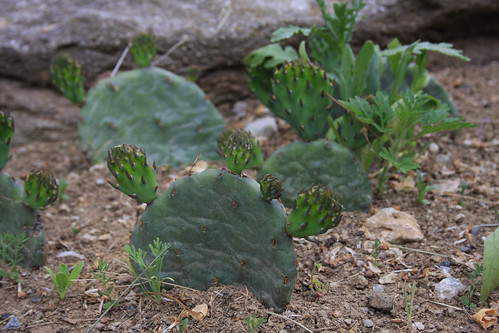
Prickly pear (Opuntia humifusa) for year-round enjoyment.
(*photo credit)
December 10, 2013 License Automobiles AND Guns
The proper order of our world demands that those with individual vehicles have some responsibility when using the public highways and roads. If improperly operated, our vehicles could hurt drivers, passengers, or others using the public thoroughfares. The argument is a no-brainer that auto operators ought to be licensed so that they are accountable for conduct on public roads. Society now expects licensing both operator/owners and likewise the vehicles used for public travel.
Gun licensing is good common sense. Some nations, states, and municipal governments accept similar vehicular operating reasoning and apply it to guns, both grading the owners and the instruments themselves. These conscientious citizens realize that stray bullets can threaten life and limb of operator or people who are within gun range. Thus, requiring a gun license makes it easier to identify those who bought, sold, traded, stole, or lost the weapon. Owners ought to be accountable for what happens with that gun, and understand their responsibility when possessing such mighty instruments of potential destruction.
The gun itself ought to be licensed. Methods of accountability exist today so that autos can be traced quite easily, even if an effort is made to hide them from the public. For autos there is less challenge because of size, but concealing smaller weapons is a concern because misuse is possible by individuals feeling a sense of power when wielding a weapon. A license addresses the public's right to know where a gun is located and whether it is under proper human supervision. Modern automatic guns are for military or police purposes and should never be in the hands of individual gunowners. History is replete with examples of gun misuse.
The gun owner ought to be licensed. It is not enough that people can hold on to a gun; they must also prove that they will do no potential harm to society. Some people (in fact a majority -- young, old, ill, mentally retarded, criminals, and untrained) ought to be denied either auto or gun operation/possession for a variety of obvious reasons. The remaining minority ought to prove proficiency through a routine of local governmental issued examinations as occurs in auto licensing.
To own a gun means to keep it in a safe place away from those who can misuse it. Licensing is good citizenship; it is a commitment to handle and store weapons properly. Even gun collectors, who do not wish to fire their articles, ought to have some form of licensing of the objects and keeping them in an inoperable condition. Both autos and guns ought to be physically verified for the sake of peace within a community.
Prayer: Lord, help us to use those possessions that could harm others in a manner most befitting of stewards of the gifts you have given us.

The Ohio River, Meade Co., KY.
(*photo credit)
December 11, 2013 Admiring the Beautiful Ohio River Valley
The Ohio is the most beautiful river on earth. Its current gentle, waters clear, and bosom smooth and unbroken by rocks and rapids, a single instance only excepted. Thomas Jefferson.
God's beauty is all around us if we but look out and see. Merely listing the wonders of portions of our Earth during warmer months season does not do full justice. The challenge is to see God's beauty in December without a snow cover -- and to discover that it gives us a sense of rejuvenation. Thus, what we need to reaffirm in dreary late fall after summer foliage turns to brilliant autumn shades and then fades, is that the landscape itself augmented by water is a wonderful sight to behold. Such is the raw beauty that unfolds in the Ohio River Valley in December.
Hope-filled citizens seek to reclaim our natural areas and do so by taking time to move through and reflect on that God-given resource. Earlier this year, long-time friend, Bob McDonald, took a five-day boat cruise on the Ohio from Cincinnati to Pittsburgh and was fascinated by its beauty, topographical features, history, and captivating charm. He mentioned that 60% of the water of the Lower Mississippi is furnished by the Ohio River Basin. That drainage basin is far smaller than the dryer Missouri Basin, even adding in the Upper Mississippi basin as well.
The Ohio River's beauty is natural and has been recognized by Native Americans, explorers such as Pere Marquette and many others. That beauty is enhanced by people's effort both in human construction and in care for the water quality of the river. Some compare the Ohio with the Rhine River Valley, though it lacks the picturesque castles and vineyards of Germany and France. Immigrants like my grandfather came to grow grapes on the slopes of the Ohio, though plans were squelched by an untimely grape vine blight. Still, the Ohio River attracted multitudes who built settlements along the banks together with architectural gems such as bridges and dams that pool the river. With time, efforts at keeping out untreated waste water and sewage have resuscitated the river and allowed large numbers of native fish species to return.
The Ohio River is called a "silver ribbon in a golden land," but it is not exclusively beautiful. Much of the planet has its own natural beauty. Just as my friend Bob gained renewed respect for its beauty through a scenic trip over a period of time, let us consider spending more time in the coming year sightseeing closer to home and finding the natural beauty with its human artifacts. With care and regulations the beautiful Ohio has returned to a more natural state -- and fewer coal-fueled power plants in the near future will assist as well. We all need to notice nature's beauty, react when harm is done, and praise efforts by those who enhance that beauty through creative and remedial practices.
Prayer: Lord, open our eyes to natural beauty and allow our hearts to be penetrated by your love and mercy.

Decorated rain barrel.
(*photo by Heidi Othan, Creative Commons)
December 12, 2013 Advantages of Having Rain Barrels
Rain barrels as water storage devices have many of the same advantages of cisterns (see June 11, 2008). Being smaller, they have far less capacity but still can come in handy when small garden plots need water replenishment. We have several barrels on our Church property and our blue one adds a sense of wellbeing to the two gardens and herb plot. In fact, my house also has a cistern that we discovered has crystal clear water and perhaps had not been tapped in a half century. We have inserted an inlet cutoff pipe for rainwater from a porch roof and are using this cistern water to refill our meditation pool. What is so great about both the cistern and the rain barrel is a source of non-chlorinated water that adds to thriving plants and gold fish.
While having both cisterns and rain barrels available are advantageous, we focus here on more accessible barrels, for many small property holders can obtain, install, maintain, and use them with ease. However, rain barrels empty fast if one does not use extreme conservation measures when watering. Directing the rain water to needed plants means enacting a watering "triage" of care: first, young greens, cucumbers, tomatoes, and leafy herbs; second, other young plants; and last and omitted root crops, brassicas, and certain perennial herbs that can endure dry weather better.
Rain barrels are placed so that runoff from a relatively small area will fill it. Screened inlets will keep out the bugs and mosquitoes. Since a rain barrel is a "good neighborhood" teaching device, some effort must be made to decorate it as a noticeable artifact for landscape enhancement. Often volunteers find this a vehicle for displaying their decorative artistic talents. ASPI and other non-profit groups have rain barrels for sale at reasonable prices, and colorfully decorated by volunteers.
Besides being a vehicle for teaching conservation, rain barrel advantages are similar to those of cisterns:
* a low-cost per unit thus eliminating the need for municipal water use;
* a source of pure rainwater lacking groundwater contamination from excess salt, iron, or other materials;
* a local resource that requires no piping of water from a distant place;
* control by home dwellers and gardeners who are more watchful when plants need additional moisture;
* absence of a need for chlorination treatment (if not used as potable water), for treated water is harder on plants;
* quite inexpensive to maintain. In very cold climates metal barrels ought to be drained (for frozen water expands), or fitted with interior styrofoam blocks to reduce pressure if undrained; and
* reduced water bills by collecting rain and shower runoff during the growing season for immediate use.
Prayer: Lord, help us respect your precious gift of water and
to conserve it when possible.

Goldenrod supporting a coating of snow.
December 13, 2013 Assisting Others in Giving and Giving Up
I must confess that I do not have patience with those who have much and yet are tight-fisted; this is especially true in this age of people lacking essentials both domestically and especially in poorer lands. Note that on numerous occasions we have addressed charity. So does the current small book by Ben Scott, Giving: Why & How Much Money Should I Be Giving to the Church, to the Poor Using Three Pillars of Scripture.
What I found so revealing was Scott's plain language in which he paraphrased the Lord in audiences by saying "25,000 of my children were dying every day of starvation and you left all your money to your children?" In some way, Scott addresses those Christians with surplus and speaks about their own salvation and how it is related to money matters. I have another approach but use the same basic Scriptural foundations -- and yet we both have our way of speaking, and I acknowledge his ability to address the ordinary middle class Christians who are out there. I emailed my congratulations on his book and his willingness to distribute it at low cost, a noble ministry of giving to and for others along with his strong record of assisting with housing in Haiti and elsewhere.
Scott is an activist who attempts to address the pandemic of omission on the part of those who can afford to give and don't, or, as he says, the 90% that do not tithe. He is correct in seeing this as a minimum rather than some ordinary monetary goal. By using Scripture to back up charity he forces others to address whole-hearted practice of giving and giving. His pillars are:
1. The great commandments of loving God with all we have and our neighbor as ourselves (Mark 12: 28-31); 2. The passage of the Last Judgment (Matthew 25:31-46); and 3. The danger of riches, If you seek perfection, go sell your possessions and give to the poor. You will have treasure in heaven. Afterward, come back and follow me. (Matthew 19:16-22).
As a fellow activist, I use similar points but expand focus to moving forward in redistributing vast sums held by the superrich and what we must do to activate this process. Scott takes on a more practical aspect of Middle America (of which I agree in part); he offers those with surplus the opportunity to give without the use of external force, namely present them with a chance to freely do what he and his friends are doing in charity. Their apostolic fervor must not be belittled, does it go far enough? For me, pure volunteerism won't do it, because too few do it. The majority hesitate in letting go of a system that is unchristian, outmoded, and perpetrating climate change and broader environmental crisis facing our world. Giving is important; giving up surplus acquired through an economic system that perpetuates the poverty Scott seeks to alleviate is another. Is it harder to give from your surplus or give up getting the surplus in the first place? Think about it!
Prayer: Lord, give us the gift of giving from a giving heart, and help us assist others in giving up the surplus that harms them.

A dusting of snow on cedar branches
(*photo credit)
December 14, 2013 Cedar and the Scent of Holiday Season
The sense of smell brings back memories, often vivid ones from older periods. Some are the odors that were unpleasant; others are the pleasing aromas that remind us of good times long past. Often the scents of this season are food-related for they remind us of holidays of long ago -- that only special cooks could generate. Others may recall rare perfumes of certain holiday residents or visitors. Maybe it is altar incense or the smell of candle wax. For others, the scents are the flowers used for decorations. My favorite is the distinct whiff of cedar (the Eastern Red Cedar or Juniperus virginiana) and the cherished hunt for the perfect but humble tree that is narrated in Appalachian Sensations: A Journey through the Seasons for December. Note that the biblical quote refers to a majestic cedar tree of Lebanon, but arbor nobility somehow extends to the broader evergreen family.
-----------------------------------
December -- The Humble Christmas Cedar Tree
I will plant it on the high mountain of Israel.
It will sprout branches and bear fruit,
and become a noble cedar.
Every kind of bird will live beneath it,
every winged creature rest in the shade of its branches.
And every tree of the field will learn
that I, YHWH am the one
who stunts tall trees and makes the low ones grow,
who withers green trees and makes the withered green.
I, YHWH, have spoken, and I will do it.
(Ezekiel 17:23-24)
No tree scent tops that of the humble cedar. It was our Christmas evergreen of choice in post-depression times. Cedars are
prolific in limestone soils and so our annual Christmas tree search
took us as a family to select a native grown tree on our land. Yes, some regard cedars as pests, but for most Appalachians they are friends. The cedar is bushy and makes a good hedge, is green the year round, and is tolerant of air pollutants. Its wood stays intact and proves itself to be an excellent preservative when fashioned into containers (the cedar chest). And cedars make wonderfully fragrant decorative boughs. Our junipers bear the biblical name "cedar" that pointed to the tallest of their noble trees, the cedars of Lebanon.
God's coming in flesh is to a simple hill people, into a mere stable, amid farm animals, and with no safe immediate home. This simple Christmas message can be told using our humblest of Appalachian trees, the cedar.
-----------------------------
Prayer: Lord, help us to see nobility in the simple things of life, and to treasure these as precious gifts in holiday season.
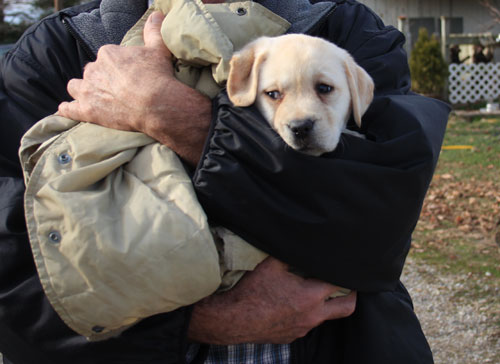
The love of a puppy.
(*photo credit)
December 15, 2013 Spread Joy Amid Today's Hard Times
I want you to be happy, always happy in the Lord. (Phil. 4:4)
On this Gaudete Sunday in mid-December Advent, we may find joy harder to elicit from everyone. Some acquaintances have to cope with illness, lack of essentials, or grave uncertainties. For them we extend compassion and if possible a helping hand. Troubles are faced by all of us in some ways -- and that means making the best of bad situations. Think of Jesus and his cousin John the Baptist, imprisoned and uncertain about the mission of kinsman Jesus. "Are you the one who is to come or are we to look for another?"
Some in a spirit of depression may ask the same question today. These are those on drugs or alcohol, who have lost family members, or have broken homes. Neighbors seek help and do not know where to turn. Our assistance can be offered in order to spread joy finding faith in the Resurrected Lord, hope in the promise of eternal bliss, and love in our shared sacramental life.
Happiness is founded in Faith. Joy and gladness are precious and fragile commodities. We need to remain in a happy state even amid uncertainty; we do not know days or hours of our lives, or even the date on our tombstone if we get one. Our future is an open book, but we can rest content in the security that only God can give. Our certitude in Faith counter-balances the uncertainties of human life. This gives us a core security that no one can take from us, and this is the ground from which our happiness swells forth. We express our confidence by inviting others to join and share together our understanding of each individual's dignity on this Bill of Rights Day.
Happiness is rooted in Hope. Our faith opens our eyes to the invitation, founded in a spiritual anticipation of being a member of the Divine Family, in which we belong through Baptism. The hope rests that the fullness of that family life awaits us in the eternal future, and this can fill our hearts with a joy that cannot be taken away. The promises of the Lord are already fulfilled among the communion of saints. Their actions in our lives make us aware of great things to come that give a perspective to troubles afflicting us and our neighbors and friends. We can share hope with the afflicted while still humming Beethoven's Ode to Joy.
Happiness is expressed in loving deeds. How else can love be expressed with meaning except in loving God through charitable deeds to our neighbors at Christmas? It's truly more fulfilling to give than to receive, and so we look about to see how we can extend the happiness that is within our hearts to others who have troubled lives at this time. In addition we can encourage others to share and give from their bounty for those in need. Opportunities abound in ways to extend helping hands through charity if we look about.
Prayer: Lord, deepen our happiness and help us encourage others to share this as part of a joyful community.
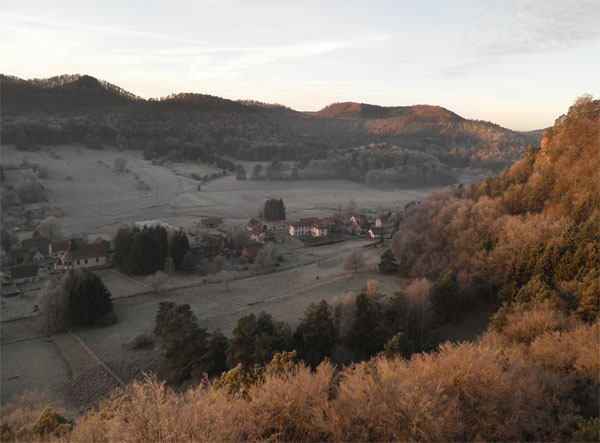
Obersteinbach in Alsace, France. Fritsch family home.
(*photo by Delphine Bauer)
December 16, 2013 Information Communications Technology Energy Use
Information Communications Technology (ICT) is part of a 21st century holiday gift bag; it has immense global social impact, and its explosion in popularity is mind-boggling. Between 1991 and 2006, one billion people had some forms of ICT at their disposal. And that number has grown to almost half the human race by now. The internet and associated communication technologies are now in the hands of average citizens on all continents and good has been attested to by the vote of the people. They enjoy linkages, commuting via Internet and cellular devices, and the instant exchange that these afford. As with all good things overuse is bad and reduced person-to-person interaction is one of the shadows.
However, there may be other detrimental effects worth considering, and one of these has a direct bearing on Earthhealing efforts, namely energy use. ICT now accounts for one-tenth of all commercial energy use in developed nations -- and without drastic energy efficiency measures this is bound to expand. Today, ICT energy use accounts for more energy expenditure than air travel and more than all global electricity generated in 1985. The first GSM (cell phone) was operated in 1991, and by 2007 half the human race had access to them in some form. Never had such a technology proliferated in such a short time in human history with such global impact. Moore's Law on the doubling of capacity for information storage every 18 months seems to continue to apply -- with its ever-increasing energy demands.
A recent paper by G. Fettweis and E. Zimmermann "ICT Energy Consumption -- Trends and Challenges" at Vodafone Chair Mobile Communications Systems in Dresden, Germany emphasized the rapid rise in ICT energy consumption and its effects on total carbon dioxide emissions. Yes, ICT climbing energy expenditure counters efforts to reduce energy use at this time of climate change problems. At the current rate of growth this ICT expenditure without some significant conservation measures could reverse progress being made. However, the authors list a variety of highly technical win/win situations, where attention given to energy efficiency will have ramifications beyond more efficient ICT to automotive and other research. Highly technical efficiency procedures include reducing IT service center cooling and energy-saving equipment.
Business and academic institutions are now showing concrete interest in ICT energy efficiency measures. One can expect that those interested in energy saving will invest much time and resources in cutting energy costs in the coming decade. ICT now accounts for 2% of global carbon dioxide emissions, and this must be reduced if we are ever to stave off a dramatic climate change that is now predicted. ICT economic and environmental concerns can be addressed quite seriously and must be for a better quality life.
Prayer: Lord, teach us to understand that even our IT devices come at a cost that must be addressed by responsible owners.

The male Northern Cardinal, Cardinalis cardinalis
(*photo by Sally Ramsdell)
December 17, 2013 The Northern Cardinal: An Aviary Winter Delight
Almost every month we reflect on a special topic of wildlife; frequently birds are the subject in general (habitat, sanctuary, counting, etc.) or in particular (crow, eagle, duck, mockingbird, owl, goose, and robin). Certainly December is a perfect time to mention our Kentucky state bird, the Northern Cardinal (Cardinalis cardinalis) or common "redbird." Popularity renders this distinctively colorful creature to be the state bird of six other states as well (WV, VA, IN, OH, IL, and NC). The cardinal is a major contributor to our regional winter landscape, since it is a permanent resident and enjoys a recent propensity to expand its range northward to two-thirds of the U.S. landscape, Mexico, and now increasingly covering parts of Canada.
Distinctively crested male cardinals bear over much of their body the bright crimson red color of Roman cardinals' vestments; they wear their attire with a sense of dignity. The female cardinals are a buffy brown or olive with red on wings, crest, and tail, and the juveniles are entirely brown. Males have black facial features like a bandit's mask and females have similar but lighter colored facial features. Both sexes have strong cone-shaped beaks. These hearty birds give us company also in song with a variation in tone (chip, cheer, and purty) and often loud and cheerful greetings by both males and females alike. Their tone is more aggressive when danger is near. Furthermore, they are willing to sound off pleasant sounds during the entire year, sunny or not.
Males and female cardinals mate for life and can live to be mid-teens and even in their twenties. Males are quite aggressive in keeping away other birds and especially male cardinals from their territory. They are even known to fight their own image on a reflective surface. The cardinal habitat is also varied: thickets or meadows, forest borders or swamps, suburban gardens or scattered bushes. They are granivorous (eating grains and seeds), but also like fruit and insects that they feed their young.
How can we keep from liking cardinals? The Cornell Lab of Ornithology considers that the Northern Cardinal is perhaps responsible for getting more people to open a field guide than any other bird. We cannot take our eyes off their plumage; we come to like them for their winter presence, their brilliant color in the snow-covered landscape, their boundless energy, and their strength and variety of song. For decades, their colorfulness, alertness, song during all seasons, and their good cheer has given a sense of wellbeing to winter landscape. Yes, and they testify that new life will appear in springtime. Cardinals are our constant friends (some were kept as pets but that is unlawful in America). Their numbers are still strong (100 million) and hopefully will stay that way. Let's enjoy the presence of cardinals for they contribute quality to our lives.
Prayer: Lord, thank you for the gift of pleasant birds and their characteristics that help us become respectful companions.
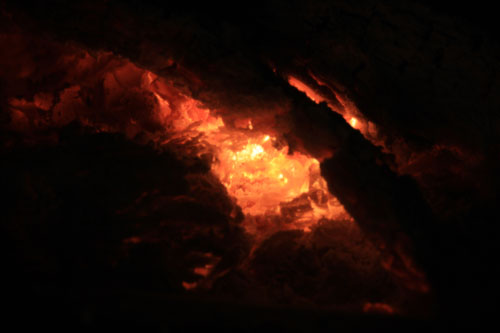
The glow of hot embers in a fireplace.
(*photo credit)
December 18, 2013 Winter and Indoor Environmental Cautions
For each month of 2013 we have looked at specific aspects of our general environment as outlined in January 3 and 4 of Daily Reflections. This final monthly contribution deals with indoor hazards. We distill pointers to avoid or improve the domestic/work spaces where we spend so much of our wintertime -- the least regulated part of our general environment. Here are a number of wintertime indoor issues, though the listing is not exhaustive:
* Air is not exchanged at the same ratio in tight insulated buildings for energy conservation purposes. Thus, chemicals such as cleaning agents contaminate the air and remain longer in winter; * Smoking, generally forbidden indoors, seems more enticing in the relaxed atmosphere of the holiday season, especially when authority figures are away for a spell and free spirits may relax the domestic rules;
* Sensitivity to complainers is not taken too seriously, especially when presented by very young who spend much more winter time inside and need to let off steam with hoops and hollers;
* Electronic devices consume electricity and may be regarded as changing the environment through resource use in winter;
* On rare days in winter that are sunny and breezy but not too cold, occupants are reluctant to air out the house by opening all doors and windows;
* Arts and hobbies may become a new venture during the long winter months, and include using paint solvents, glues or binding agents, or firing unvented pottery kilns (note chemical-laden photo shops are in decline);
* Kerosene and other heaters are pushed into service during colder days and emit toxic fumes and especially dangerous carbon monoxide;
* Guns of all varieties are displayed frequently and that disturbs tranquility of domestic society by their mere presence;
* Wood smoke from faulty fireplaces is a seasonal concern especially when used during holiday celebrations;
* Radioactive materials in some regional soils infiltrate the closed winter quarters more severely if not exhausted;
* Leaking chemicals within homes or garages include pesticides and automotive products along with building and binding materials such as glues, caulks, and solvents that need proper ventilation; * Residents forget to purify air with houseplants and ought to consider these as Christmas gifts for friends with stuffy indoors. Be kind and give yourselves a few pots;
* Excessive and loud music is the one indoor pollutant that is often overlooked because it is music to some and distraction to others within or near the living space; and
* Air fresheners for merely scenting the winter stale place with deodorizers exacerbates the problem of unvented conditions, for they only anesthetize the nose and keep us from knowing what is really going on.
Prayer: Lord, help us to be observant in winter when we become more or less indoors people striving to live healthy lives.

Small waterfall. Watts Ferry, Woodford Co., KY.
(*photo credit)
December 19, 2013 Reflection or Action: Which Is First?
At the end of ten years of daily reflections isn't it time to reflect on "reflection?" This raises the perennial question: which comes first: reflection on what has to be done and then acting responsibly, or some sort of action, and then reflecting on what is right or wrong about what has taken place? We recall that for Aristotle experience takes precedence over understanding. Does this in some way apply here?
The primacy of reflection has good arguments, especially since activists do not regard taking time to articulate before acting. It may seem obvious to the more "level-headed" type that reflection always comes first. The history of Western thought is replete with strong reasons for thinking before acting and even has examples of those who have done so. Name some! Thinkers find great comfort here, for activists are criticized for being too impulsive. Thinkers justify slow movement to action through well-articulated reasons sounding better than to move out and do something now -- spinning the wheels of emotional stress. But does this reluctance allow thinkers to justify their own reluctance to risk-taking and to cover it with a veneer of self-righteousness?
The primacy of action has its arguments as well. For many, emotion and intuitive impulse carry the day, and one acts at once and then thinks over what has happened. Sounds dangerous? Not exactly, especially after a long life when one observes the hesitant allowing the worst tragedies to occur for failing to act when needed. It may take time to cogitate but in many cases the action must occur immediately, and the luxury of reflection may come later. Isn't reflection looking back upon and not necessarily looking ahead? Shouldn't activists who reflect deeply on past experiences be better prepared to act more promptly and properly? Activists bolster their arguments because often thinkers are determined to preserve and justify the status quo. For activists, a primacy of reflection has a flaw: why so slow? Why tolerate unjust conditions (climate change problems, financial disparity, unemployment, misuse of chemicals in drugs and medicines, etc.)?
Simultaneity perhaps ought to replace primacy. Both reflection and action are important for the global issues needing to be addressed. Good teamwork in our troubled world needs the coordination of theorists and activists. One must inspire and inform others. Could we augment the philosophical discussion by a theological insight as Christmas approaches? The eternal One becomes flesh (incarnation is God reflecting on self and becoming one of us and dwelling among us). Christmas solves the supposed riddle of primacy. We need incarnate word acting and reflecting upon itself, and thus Jesus growing in wisdom and understanding. Let's work as teams for we individuals need the ongoing input of those with emotion and those who reflect constantly on matters.
Prayer: Lord, let us see the place for human reflection and
acting even when time is short and solutions are urgently needed.

Baking holiday cookies to share.
(*photo credit)
December 20, 2013 Providing for Season's Special Treats
Special times deserve special attention, and the Christmas season is one such special time for those who profess the Coming of the Lord. Christians know that divine love must be shown in our own unique actions and so we prepare treats and encourage others to do likewise. Our church communities that give Christmas charity and gifts of food, clothes and toy treats to individuals and families attempt to express divine love shown to all of us in and through ourselves being the hands and feet of Christ.
Preparing and distributing treats becomes a holiday chore. However, there is a special joy coming in giving and another in the hearts and smiles of those receiving. We all get a glimpse at the beginning of the Kingdom of God being established in our midst. The season of treat giving is here because God gives us a special treat in the coming of Christ and in inviting us into the Divine Family. Our new book Appalachian Sensations: A Journey through the seasons gives a reflection on mountain seasonal treats.
-----------------------------------
December -- Providing Christmas Treats
Why spend your money on what is not bread,
your wages on what fails to satisfy?
Listen, listen to me, and you will have good things to eat
and rich food to enjoy.
(Isaiah 55:2)
Christmas meant for me the taste of oranges -- a rare treat for the occasion. Now, seventy some years later, citrus fruit is always found in our grocery stores and is less expensive. It takes extra effort to realize the bounty that we have and take for granted. We manifest appreciation when we share with the less fortunate. This is a long Appalachian tradition, especially at Christmastide.
We so often turn our attention to what is not yet achieved; we make effort to attain more and more material goods, which in turn, do not truly satisfy; this can lead to a secular and materialistic Christmas message. In order to combat this, we need to devote ourselves to spiritual growth and to learn the true meaning of Christmas, when the Lord comes into our lives in a special way. Let's remember the have-nots of the world and send donations for those who are far away, and Christmas baskets to those near at home. Let's work so that the hunger of so many may be relieved by socially-just policies in their respective lands. We are blessed, and our task is to extend our blessings to others who are in need -- and make the entire year a Christmastide.
-----------------------------------
Prayer: Lord, your invitation into the Divine Family is the heart of Christmas mystery, namely an eternal treat.
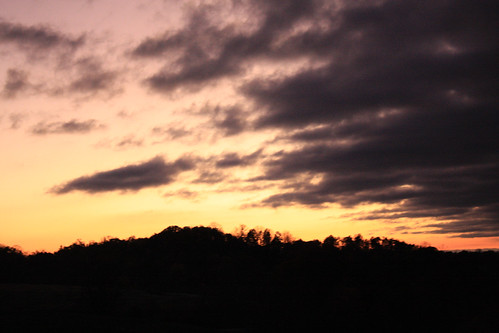
Encouraging glow of late-December sunset.
(*photo credit)
December 21, 2013 Christening the Yuletide
Yuletide may have been a heathen festival dating far back into unrecorded Germanic and Scandinavian history around winter solstice. Like other such pre-Christian celebratory events (Epiphany, Easter, Halloween, etc.), Christians have baptized these cultural occasions and identified in a deeper spiritual manner with them. Scottish people use the words Christmas and Yuletide synonymously. "Solstice," if secular, can have spiritual meaning.
Don't hibernate, for new life stirs deep within. The sense of the upcoming season is not retreating into a sleep phase or hibernation but search for new life that is soon to start in movement of roots by early January. The expanding of daylight is something more easily observed than root growth, and so we strive to uplift our spirits as the winter season progresses. The strengthening of days increases our enthusiasm for a new growing season, a season of the coming of Christ. Believers say with assurance that the Light of the World is among us and grows in age and wisdom. Thus a temptation to sleep will not hinder us.
Enlighten with a new light. Certainly, non-Christians use this naturally occurring phenomenon of the winter solstice as a time for special events, and rightly so. A new season starts. We Christians see this as ushering in the New Light season from now through Purification to Easter. A world dimmed by quarrels and discord must be awakened. With the light of Christ we redouble our efforts, search for new insights to help usher in the reign God involving peace and justice for the world's hungry and refugees. Are we not to be lamps for those stumbling in despair and error?
Warm hearts with a new hope. As we approach the "Yuletide" season we convert this into the "Christmas" season through kindness and charity shown to others, some of whom lack friends and companions. We are unwilling to let troubles get us down but rather show that hope springs eternal; the Eternal One is now in our midst and winter is warmed by his presence. The Yule log, a special ornament in ancient times, becomes the first that burns in the loving heart of Christ, a warmth that blazes with love for all. In that warmth can we seek to reactivate the tired hearts of many?
Restart anew and retire the old. Old ways have had good qualities and yet are imperfect. Think anew; Christmas is a season to discover the gifts of others with their own innate gifts not yet fully actualized. We become christs to those with potential resources for change; let the poor and ill be regarded as sources of energy and hope; let the precious time be found as opportunity and not a countdown to catastrophe. In fact, summer's heat can paralyze us where winter's frigid weather can sharpen our creative juices. Set up the drawing board, open communication with positive folks, and launch the new. Winter is a launching time, isn't it?
Prayer: Lord, allow us to stir during this new season and to
try new things for your honor and glory.
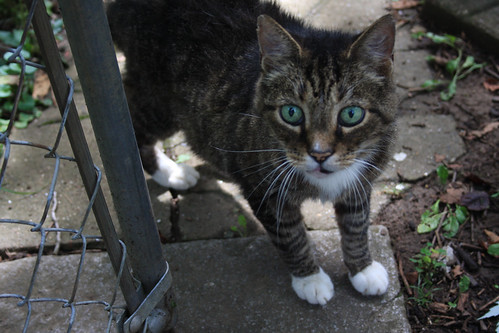
Tony, new kitten for Christmas.
(*photo credit)
December 22, 2013 Support Those Who Are Starting Families
...and they will call him Emmanuel, a name which means 'God- is-with-us.' (Matthew 1:23)
The new couple, Joseph and Mary, begin life together in such trying circumstances. Mary is a simple virgin and yet she is with child, and Joseph is overcome with what to do about this unexpected situation; he is a man of honor and tries to act so as not to hurt anyone and especially her whom he loves. To expose Mary before the hostile public would mean her very honor and even life could be threatened. Joseph faces a dilemma; his sense of justice is like a cloak that covered his entire being. In such circumstances, God speaks through an angel, telling Joseph to take Mary as his wife for she has conceived by the power of the Holy Spirit. Joseph offers Mary the protection needed in these trying times.
This is the story of the beginnings of the greatest family who ever lived -- and yet what a situation! Today, in many lands less but still trying circumstances confront new family beginnings: uncertain jobs or dowries, inadequate private lodging, or threats and insecurity. New parents are challenged in bringing offspring into this troubled world with its host of new problems: improper natal care and childbirth facilities, unsteady breadwinner employment, improper housing, lack of medical insurance and care, high-priced education of children, dearth of companionship during youthful development, isolation, few recreational opportunities, environmental pollution, and on and on.
The listing of anticipated child-bearing and rearing challenges is certainly incomplete, and we have omitted extraordinary events that could occur such as unexpected illnesses that could plague family members. What about matters of security as plagued the Holy Family who were forced to move elsewhere at a moment's notice? While the ordinary is challenging, the extraordinary requires spiritual fortitude and grace and total trust in God. To cope with the extraordinary, the broader community must take part in a special way through needed social programs to help vulnerable families.
Individual families must make their own family decisions, but circumstances and barriers are community matters when they impinge on the wellbeing of budding and ongoing families. Child-bearing is more individualized than child-rearing, though all aspects of family life are a responsibility of the greater community. Christ is in our midst and is close to struggling families. Like Joseph and Mary, family members today must listen to the Holy Spirit speaking to them with open minds and hearts. Like Mary and Joseph we are eager to find solutions within the broader context of a family within God's care. With God's help and communal cooperation we can strengthen hard-pressed families in these troubled times.
Prayer: Lord, help our budding families to bring forth
children and inspire us to help in the many ways we can.
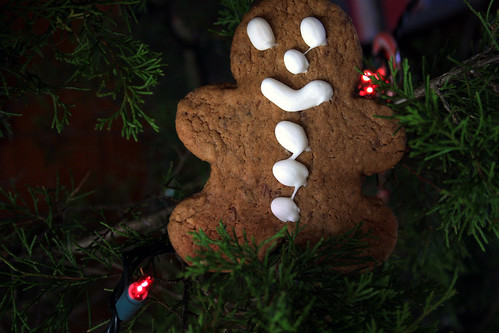
Traditional gingerbread cookie adorns Christmas tree.
(*photo credit)
December 23, 2013 I Have a Christmas Dream
In this year of the 50th anniversary of the March on Washington in which Martin Luther King gave his "I have a Dream" speech, it is both good to review his talk and its stirring oratory and to articulate our own dreams for the coming year. Youth have simple dreams of material things dancing in their heads; elders nearing the end see Christmas in a different perspective.
I have a dream -- that all of us will see a world of global equality, for we are one family albeit large and of different folks. This is a family that has enough on the dinner table for all to satisfy their "right to food" as India's is striving to provide its poor. Besides nutrition, this global family has safe housing with private rooms for each family unit. May the building have doors leading to common living space so that we can gather on occasions and converse with each other. If everyone on Earth has affordable basics of nutrition and lodging, the global family will celebrate together and not suffer from insecurities.
I have a dream -- that water is pure and plentiful and that families can picnic in secure surroundings, that old folks can stroll in safe areas and kids can romp and play with each other without fear. We can come together and compromise on how much sound is allowed and agree that periods of silence are respected. May the environment be healthy and the climate change be slowed and may we come to our senses and tap deeper into renewable energy resources. We should avoid catastrophic events and recover quickly when any should happen to occur. Our neighborhood is large enough to include space for wildlife to live and thrive.
I have a dream -- that everyone on our planet has a right to basic health, and that facilities are available for them to get the treatment and medicines that is known. Some of our brothers and sisters have special health needs and our dream is that their treatment is part of a total picture. All youth and old can have facilities for reasonable basic education and literacy, and the more talented the access to professional training. My dream is that all have a right to congregate, to speak and to publicize their wares on the Internet, to worship as they see fit-- and that others respect these rights. Included is that basic right to a livelihood that includes all, with the right to earn their own living by a guaranteed job with governments as ultimate employer.
I have a dream -- that these preceding issues can be fully implemented, when we activate the will power through spiritual intercession to make the necessary changes in our consumer-oriented world. May it be transformed into a sharing one. May we have courage to break the spell of disparity of wealth and unfair tax havens, that basic needs are met, and that a commonwealth of prosperity succeeds through cooperative efforts.
Prayer: Lord, make us agents of change to hasten the radical transformation needed to bring these dreams to fruition.
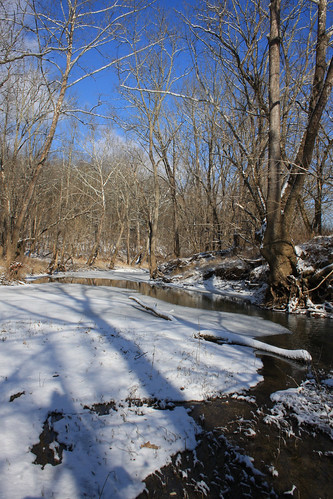
Snowy scene along Thompson Creek.
(*photo credit)
December 24, 2013 The Burning Babe on Christmas Eve
As a Jesuit I have a special devotion to our heroic martyrs of yesteryear. One of these is Robert Southwell (1561-95). In my only visit to the Tower of London (prison) in 1972 I inspected the carvings on the prison cell wood work and found the name "Robert Southwell." In utter fascination I asked the Beefeater standing at the cell door, "Is this the carving from the Jesuit poet Robert Southwell?" He did not understand my American accented question at first and asked me to repeat: in response to my earnest request he said "I am a Protestant." Wow! Maybe that interchange still needs the healing Christmas season and that can best be done in words of Southwell himself that we burn off old hostility and focus on Christ himself.
The Burning Babe
As I in hoary winter's night
stood shivering in the snow,
Surpris'd I was with sudden heat,
which made my heart to glow;
And lifting up a fearful eye,
to view what fire was near;
A pretty Babe all burning bright
did in the air appear;
Who, scorched with excessive heat,
such floods of tears did shed,
As though his floods should quench the flames,
which with his tears were fed.
"Alas!" quoth he, "but newly born
in fiery heats I fry.
Yet none approach to warm their hearts
or feel my fire but I.
My faultless breast the furnace is,
the fuel wounding thorns;
Love is the fire, and sighs the smoke,
the ashes shame and scorns;
The fuel justice layeth on,
and mercy blows the coals;
The metal in this furnace wrought
are men's defiled souls,
For which, as now on fire I am
to work them to their good.
So will I melt into a bath
to wash them in my blood."
With this he vanish'd out of sight
and swiftly shrunk away.
And straight I called unto mind
that it was Christmas Day.
Robert Southwell
Prayer: Lord, prepare us this evening for the great event of your coming in our lives in a special way. Help all Christians to
stand together and be warmed by the fire of your burning love.

Marker for birth of Christ, Bethlehem.
(Photo by Christyn K., Creative Commons)
December 25, 2013 Christmas and Bethlehem: City of David
Today in the town of David a saviour has been born to you: he is Christ the Lord. (Luke 2:11)
I only once saw the beautiful little city of David in its entirety from up on a hill crest -- from a location few residents or visitors are privileged. It is an image that never leaves me, as clear as the spring morning air in 1992 when I gazed upon it. Our small bus had arrived in darkness the night before and the city below only cast shadows, though its name was burnt into Christian consciousness: Bethlehem. I awoke as always early in an armed Israeli encampment where we participants at the Society for the Protection of Nature in Israel (SPNI) were staying. The other two dozen were still asleep. I went outside the dorm and strolled the limited yard space. Unfortunately, the place was enclosed with high fencing, but through the barbed wire I could see Bethlehem, the "City of David" in the valley, a peaceful scene except presented through stern security measures. And I had no camera!
Was this the very spot were shepherds were feeding their flocks when the Angels came to them? Was it here that they heard the heavenly voices announced to them tidings of great joy, that the Messiah was born there in Bethlehem, that City of Bread and the one who would someday feed a hungry world? These humble shepherds went to see for themselves the ultimate one who could feed everyone spiritually. The contrast of peaceful city and barbed wire was overpowering. I looked more carefully through the fence and saw that a previous corner of rusted wiring was just beyond. It must have fenced a former stronghold camp probably by Ottomans or British or Jordanian forces, for the old-fashioned barbed wire had a century-old look. Many strived for peace and security over the years and it is still to be achieved there and elsewhere.
Why has peace so eluded us even after the arrival of the Prince of Peace two thousand years ago? And since that observation, is not Bethlehem now cut by "protective walls" in the 21st century? Bethlehem is itself an unfinished postcard just as my momentary viewing through barbed wire. Maybe this is the unfinished story of Christmas, a story of He who came, who is, and yet must come again to bring the true peace that so evades a war-torn Middle East and world. This is an issue for all to ponder.
How can we bring tidings of Good News to a stricken world? Are we messengers of peace or must conditions so needed for human welfare still await another hundred or thousand years? Are we as powerless as I felt when looking at Bethlehem that only time in a visitor's dawning day? It's not the place but the person that came, is, and will come again. The bringing of glad tidings is ours to convey and that makes Christmas more than past history; it still is coming but without enclosures if we break loose.
Prayer: Lord, give us the simple faith of the Shepherds and allow us to see and to go forth with Good News today.
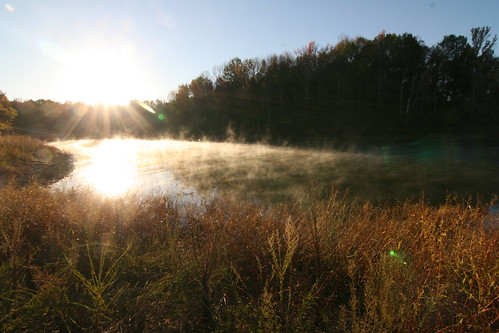
Eastern Kentucky sunrise.
(*photo credit)
December 26, 2013 Reaffirming Our Trust in God
At the end of this year, we ought to reaffirm the motto "In God We Trust;" this is the proper atmosphere in which our country and world needs direction. Trust in God is counter to a trust in material devices and an all-consuming consumer culture racked with uncertainty and insecurity. Through such trust we can cultivate a firm faith in the future, hope that we have the power to get there, and love of our imperfect but striving global brothers and sisters.
Quite often in the past series of Daily Reflections we have mentioned the alluring and captivating influence of our consumer culture. However, in the Christmas spirit we are called to be countercultural and willingly critique where we are and how we are to make positive changes for improvement. The end of the year is a perfect time to restate a series of steps leading to a more perfect global union. From the summary chapter of Reclaiming the Commons we reassert our commitment to regain the commons:
1. Being aware of material allurements drives us to pursue deeper commitments. We shutter at seeing the impending global catastrophe facing us today: dramatic rise in carbon dioxide and methane levels; endangerment of oceans and land habitats; violent weather conditions; etc. Equally difficult is an economic system allowing vast wealth for a small number. We must confront the material wealth that hypnotizes the gullible, dangles crumbs before the hungry, cautions patience, and tries to silence prophets.
2. Recognizing and responding to urgency results in taking remedial actions that are not perfect but require collective active and mutual critique. Tweaking a broken system is soon seen as evading the heart of the crisis. Materialistic profit motivation captivates but does not satisfy; only spiritual motivation can.
3. Recognizing inadequacy of individuals working alone occurs when working to bring about change. While mesmerized by modern allurements, we attempt to take remedial steps alone and so look out and see a greater WE who suffer in much the same way. We cannot deny the situation; we cannot excuse ourselves from acting; we cannot escape our social duties. We join forces, but this brings us to another heartbreak; we are addicted people and lack the use of full rational powers to handle the tasks at hand.
4. Turning to a Higher Power enables us to have the enthusiasm to continue the work we are undertaking. Alcoholics Anonymous members and ex-drug users recognize their inadequacy and seek a Higher Power. A similar pattern needs to be followed once social addiction is recognized. Conquistadors crossed oceans for gold; navigators sought shorter shipping routes for spices; trappers tramped through vast territories collecting furs. Such material quests have become outmoded and call for spiritual motivation, in
which we find energy to change our broken world.
Prayer: Lord, show us the way to improve for the coming year.
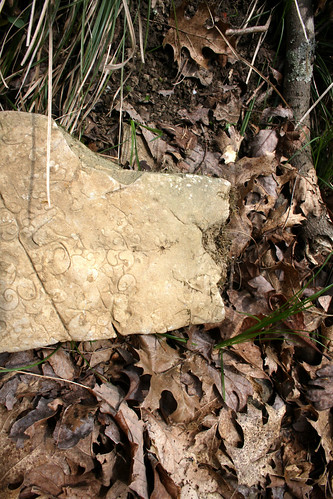
Lexington limestone, with embedded fossils.
(*photo credit)
December 27, 2013 The Pro-Life Field Must Expand
Those of us within the pro-life movement know that individuals have limited concerns. Pro-life boundaries have expanded from early concerns about constitutionality of abortion to the pressure by advocates to include end of life issues as well. In turn, the pro-life folks incorporated abolition of death penalty and quality of hospice care as part of the overall issue area over the decades. Since 1973 and the Roe vs. Wade Decision, the field of concern by pro-life forces has expanded in a natural sequence to show deep concern for human beings and the right to life.
Perhaps the expansion of pro-life by Cardinal Bernardin to include peace issues was one significant advancement that came in the decade of the 1980s and 90s. This gave an extended social justice flavor and found opposing constituencies within the right-wing portion of the pro-life movement, who were more inclined to a pro-military stance that could and often includes nuclear armaments. Some argued that this weakened and diluted resources and attention to the anti-abortion issue. Others argue that this calls for a fuller embrace of a culture of life.
In the twenty-first century two allied and overlapping issues extend the pro-life agenda and, instead of diluting it, open it to new supporters, namely environmental and climate change people (who often overlap). Some of the latter regard a distinction as needed because of the desire to take more drastic civil disobedience stances than normally advocated by traditional environmentalists. However, the pro-life vision now becomes a little more nuanced.
Pro-life environmentalism means that life includes plants and animals, and so the existing variety of species (not necessarily individual life by those accepting animal products for food) is to be preserved and worthy of a pro-life stance. Furthermore, if the vitality of Earth is jeopardized, then human and other Earthly life is so interconnected that defense of life is all embracing. We need a viable world to have an authentic pro-life stance. In the same manner a pro-life person concerned about climate change is highly focused on the future grandchildren and coming generations.
Focusing on the human dimension of future generations would possibly appeal to the non-doctrinaire so-called conservative-voting pro-lifer. Here, diverse constituencies have a great opportunity to come together within the expanded pro-life umbrella. Why not defend future life as much as the life of a current fetus or old person? For those who say, "What else are you to add?", the response is, "Why not call all life sacred and not restrict this all-encompassing matter?" Yes, all issues that threaten, reduce the quality of, or terminate life deserve addressing at this time.
Prayer: Lord, give us courage to defend all forms of life, that existing in our troubled world today and life that is surely to come in a future generation.

Warm nest for Carolina wren, Thryothorus ludovicianus.
(*photo credit)
December 28, 2013 The Church Encouraging Catalytic Action
As the Year of Faith concludes in 2013, we ought to see the Church in the full role of speeding up the changes needed in our troubled world. The closing section of Chapter Nine in Reclaiming the Commons points out the need for this catalyst. Let us recall that chemical catalysts are small but strategically located; that is what the Church must be -- not necessary bulky or overwhelming in majority, but rather a corps inciting change where and when needed. This is a paradigmatic shift in viewing "church" with its expansiveness over territory and people. All are invited but those who come must be prepared to be pacemakers, setting the tone of what has to be done in the world. In calling for profound change there is the strong possibility of disturbing the status quo.
----------------------
Church Forming Catalysts
What we are waiting for...the new heavens and new earth.
(II Peter 3:13)
The reason, why the Church must renew itself and thus show God's presence, is because this troubled world needs an institutional catalyst to hasten its move to the end. Agents of change realize how powerless individuals can be without community support -- and committed groups can move forward. The Church as a body of believers is a global community of support, who believe in the mandate to share, as God has done with us. The great temptation for Church leaders is to become beholden to the status quo, as if such a deadening attitude will hasten the day of the Lord. In fact, such conformity only retards growth and fails to comprehend the need to help give direction to globalization. The temptation is to be silent when change is imperative.
Action 1 -- Expose culprits and do so forthrightly.
Forthright and deliberate exposure of policies that retard the sharing of resources is necessary at all times through recourse to the media and all means of publicity. The lessons from heroic men and women throughout history need to be retold, and the temple always needs cleansing of its moneychangers.
Action 2 -- Encourage members to be agents of change.
This can be done through counseling and holding leadership programs, retreats, and conferences. We must muster the courage of the people. Furthermore, it can and must be done through a new Church Council including all Christians of good faith, and attended by believers in a renewed Earth. Such a gathering ought to be poised to streamline and modernize Church governmental agencies, so that the Church shows its commitment to profound change affecting all people in need of a better quality of life.
-----------------------
Prayer: Lord, give us the insight to see that we are people who need to be energized to make the necessary changes in our world. Inspire us to be placed where action is most effective.
-----------------------
Friends, we urgently need your help. As a
visitor you are familiar with Earth Healing and that this
non-profit informational service has brought you "Daily
Reflections" since 2004. Now, due to changes in
funding, we may be in the final twelve months of the Earth
Healing website service - without your help!" Click here for more information on
how you can help...

Eastern box turtle, Terrapene carolina carolina.
(*photo credit)
December 29, 2013 Families Fleeing to Safer Places
The day this homily was started the news mentioned that one million Syrian youngsters had completed the flight as refugees to one or other neighboring country. Families fleeing warfare is not new; my cousins fled the French border in World War II. The Holy Family did just that in Matthew's account of a sudden awakening and a flight into Egypt. The story continues as thousands of families pull up stakes as Arab Spring moves to winter of discontent.
Why leave? The problems associated with fleeing are so utterly immense that one questions why so many want to flee. We have no clue of what they experience in unsafe conditions: homes damaged or destroyed, fear of rape or hostile aggression, panic on the part of neighbors, the unraveling of community security means, problems with basic services and food, and on and on. The problems facing the twenty five million (internally or externally displaced) refugees today are immense and varied. We ask ourselves what would we do in their circumstances? Simply put, dangers drive these destitute folks to seek safety elsewhere.
How is the journey? Artists through the centuries have depicted the Holy Family traveling via donkey to a distant land, with Joseph walking ahead with staff at hand. "Journey" means a day's work and that is what fleeing is about. Today we travel with conveniences but refugees on the road must contend with insecurity, hunger, lack of water, no certain place to rest, an alien land, culture and language, and uncertainty of destination. Think of all the people who strived to come to America's shores over centuries and how many did not make it due to shipwreck or illness. Travelers find it hard enough, but this multiplies manyfold for refugees who lack friends, companions, and welcoming hosts.
What is in store? Destinations are not easy places for the refugees. The culture is different; the food if easily obtained is not what one really likes even, if it keeps body and soul together. Housing is a problem, even if the breadwinner can find some sort of work to keep employed. Language is an added difficulty, for most do not speak in an understandable fashion. All, and especially youth, have little chance for good health and educational services. What about lack of communications with folks back in the homeland? Refugees, even if slightly safer in a new host land, do not find comfortable living in camps or makeshift accommodations. The family of refugees must close in upon itself and help each other seek bare essentials to survive. Such did the Holy Family.
What can we do? We need to pray for refugees and show hospitality for any strangers in our midst who are refugees from foreign lands. We can contribute to refugee organizations when opportunities arise and encourage peacemakers to stem the flow of refugees. Hopefully, in 2014 refugees may return to their homes.
Prayer: Lord, make us aware of the refugees who are so close
to our minds and hearts on this feast day of the Holy Family.
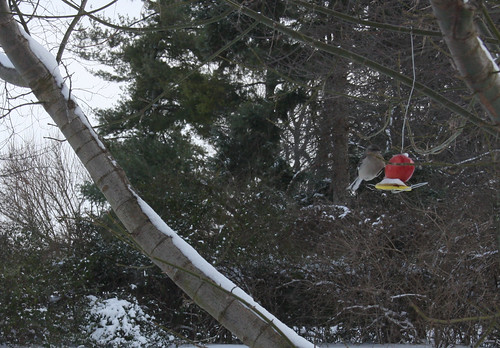
Sharing holidays with the birds.
(*photo credit)
December 30, 2013 Ten Highlights for Horizon Watchers
The following is not some sort of prediction of what will occur, but the movement in a direction that suggests what could possibly happen considering the present run of things as viewed from my eyes. Our hope is that dramatic but unforeseen changes will alter events for the better, but will this happen? What do you foresee for 2014? Are you willing to go on record? Here is the risk of over- (or under-) statement.
1. Globally, wars in the Middle East will not abate in any noticeable degree and may get even more serious in Syria, Egypt, and Palestine -- and perhaps Yemen and other parts of greater Arabia. The hope for a peaceful resolution in a short time seems remote -- but we can hope and pray.
2. Indicators point to an economic rebounding to a modest degree in this country, though many nations in Europe will struggle to regain pre-Great-Recession levels. It is quite possible that recession will actually deepen and lead to social upheaval.
3. Global energy demands will continue to rise, causing Earth's Carbon Dioxide levels to climb far past the 400 ppm benchmark now being reached. There is little change in rates expected in the coming years, even though wind and solar renewable energy applications continue an increase and nuclear power fades. 4. Pope Francis, if he heeds his security service advice, will continue to excite crowds and make his mark on world history through his efforts at sharing goodwill with others.
5. Nationally, American snow piles will be setting records in parts of the Eastern United States -- though Canada will have a normal winter -- thus says the Farmer's Almanac.
6. The XL Pipeline/fracking in public lands controversy will change the nature of the environmental movement in this country if not the world; this happens if XL becomes a bargaining chip to overcome the debt rising and budgetary crises facing our nation.
7. Transfer from paper to digital will continue at an ever faster pace with new problems arising for traditional retailers, book publishers, and dealers -- and more and more media advertising shifting to digital areas.
8. Statewise, Senator and Minority Leader Mitch McConnell will be given the scare of his life in the upcoming election by my old Scoutmaster's granddaughter.
9. Webwise, since Earthhealing has presented 2920 different Daily Reflections over the past decade, it seems time to invite more guest writers and even a possible change in format on this website. What do you think?
10. Spiritually, the Kingdom of God will continue to grow (a hard factor to evaluate as to success on a short-term basis).
Prayer: Allow us, Lord, to look beyond the horizon with hopes of better things in the offing, and seek a fresh sunrise.
-----------------------
Friends, we urgently need your help. As a
visitor you are familiar with Earth Healing and that this
non-profit informational service has brought you "Daily
Reflections" since 2004. Now, due to changes in
funding, we may be in the final twelve months of the Earth
Healing website service - without your help!" Click here for more information on
how you can help...
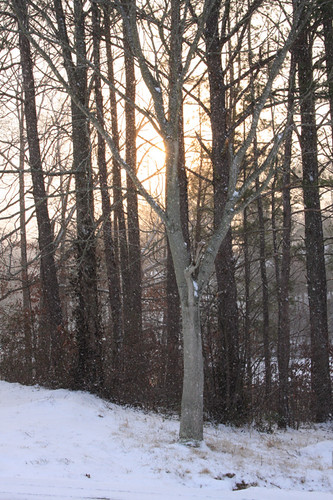
New Year's Eve snowfall.
(*photo credit)
December 31, 2013 Bestowing an American Blessing
May our blessing as a nation
descend upon you from home or abroad,
a movement from our heart to yours.
May the sun that shines on all
add extra sparkle through our cheer
and warm you and yours with our spirit.
And may you capture and hold that sense
of wonder through our blessings,
like a cherished lighthouse,
which all can see amid storms;
May kinship grow in our hearts as well,
a contagion of sister- and brotherhood.
And may our shared climate be gentle
and changes less caused by us,
warming but not too much
and cooling at least hot tempers.
May the oceans hold the melt
and wave rock all so lightly,
that shore dwellers may stay
and keep their humble abodes.
And may this year past give its blessing
like soil-soaking rain
becoming springs of utter generosity;
May the rapidly approaching year
usher in a promise that we share
our gifts with a needy world.
And may our blessed continent
always open her doors,
to those from war-torn lands;
May we welcome strangers to liberty
and along with a kindly glint
dispel discomfort with a welcome mat.
May the soil squish between your toes,
knowing that touching is part of life;
and may we stay bonded to our Earth
after we have trod our muddy breadth.
When we seek rest from life's travels,
may a piece of this blessed land
hold our non-descript dust
till eternal light energizes all.
Prayer: Lord, help us extend this blessing to all for a Happy New Year.
The Earthhealing Team |